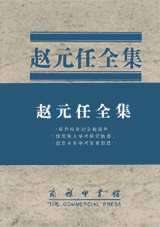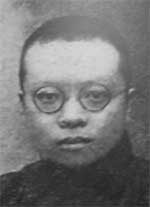 Two days ago was the 68th anniversary of the death of Qian Xuantong (Qián Xuántóng / 錢玄同 / 钱玄同 / Ch’ien Hsüan-t’ung) (1887–1939), a phonetician, philologist, and professor of literature at Peking University. Although he isn’t well known today, Qian was an important contributor to the reforms associated with the May 4 movement. He also helped renew debate about script reform in China.
Two days ago was the 68th anniversary of the death of Qian Xuantong (Qián Xuántóng / 錢玄同 / 钱玄同 / Ch’ien Hsüan-t’ung) (1887–1939), a phonetician, philologist, and professor of literature at Peking University. Although he isn’t well known today, Qian was an important contributor to the reforms associated with the May 4 movement. He also helped renew debate about script reform in China.
Just about the time that the National Phonetic Alphabet succeeded in gaining ascendancy over the Mandarin Alphabet and other schemes, the evolution of literary and political movements into a new stage gave rise to renewed consideration of the roman alphabet as the basis for reform of the Chinese written language.
What seems to have initiated the new stage of discussion was a letter written in March 1918 by Ch`ien Hsüan-t`ung, a well-known philologist and professor of literature at National Peking University, to Ch`en Tu-hsiu, who at the time was editor of La Jeunesse, the leading organ of young Chinese intellectuals, and who soon afterward became one of the founders of the Chinese Communist Party. In his letter Ch`ien Hsüan-t`ung expressed approval of Ch`en Tu-hsiu’s demand for a break with the Confucian ideology which had dominated Chinese life for more than two thousand years, and also offered his idea as to how this was to be carried out. “If you want to abolish Confucianism,” he said, “you must first abolish the Chinese script.” To his mind there was little of value in Chinese literature, 99.9 per cent of which he dismissed as merely transmitting Confucian ideology and Taoist mythology.
It seemed to Ch`ien that the ideographic [sic] script could not be adapted to the needs of modern China. He also saw no solution in the attempts which had thus far been made to apply a phonetic system of writing to Chinese. Indeed, it appeared to him that it would be impossible to apply a phonetic system of writing to Chinese at all. These views also led him to the conclusion, reached earlier by Wu Chih-hui and others, that Chinese writing itself would have to be abandoned and replaced by Esperanto.
I seem to remember that someone in Japan was driven to distraction about that country’s orthography and making a similar proposal about switching from Japanese to Esperanto. Or am I imagining that?
At any rate, others soon convinced Qian of the error of his ways, and before long he was a strong supporter of romanization, as were many others of his generation, including Lu Xun. By the way, Qian was the one who convinced Lu Xun to start writing stories. That alone should be enough to make the world forever grateful to him.
I strongly recommend the first of the readings below, from which the above quote was taken. It’s interesting reading.
sources:
- “One State, One People, One Language,” from Nationalism and Language Reform in China, by John DeFrancis, 1950
- 1939 nián 1 yuè 17 rì: Qián Xuántóng bìngshì yú Běijīng (1939年1月17日 钱玄同病逝于北京), January 17, 2007

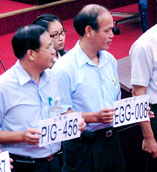
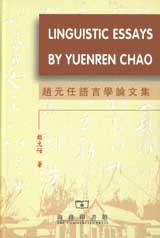 The
The 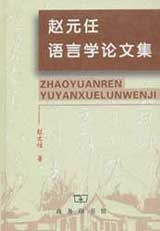 Note how the cover of Linguistic Essays, a book printed just last year in China, uses “Yuenren Chao,” the traditional spelling and Western order of his name, rather than “Zhao Yuanren,” the spelling used in Hanyu Pinyin. Also note how the Mandarin title is given in traditional, not simplified, characters: 趙元任語言學論文集, not 赵元任语言学论文集. A nice surprise, on both counts. On the other hand, the botched romanization on the cover of the Mandarin-language collection, which gives “ZHAOYUANREN YUYANXUELUNWENJI” instead of “
Note how the cover of Linguistic Essays, a book printed just last year in China, uses “Yuenren Chao,” the traditional spelling and Western order of his name, rather than “Zhao Yuanren,” the spelling used in Hanyu Pinyin. Also note how the Mandarin title is given in traditional, not simplified, characters: 趙元任語言學論文集, not 赵元任语言学论文集. A nice surprise, on both counts. On the other hand, the botched romanization on the cover of the Mandarin-language collection, which gives “ZHAOYUANREN YUYANXUELUNWENJI” instead of “